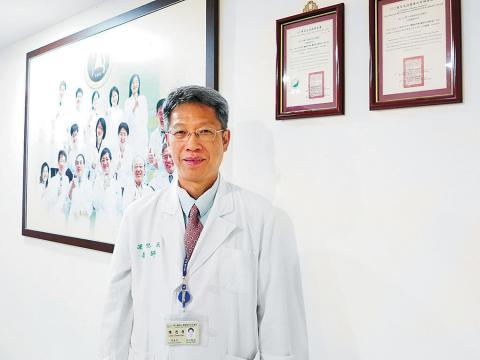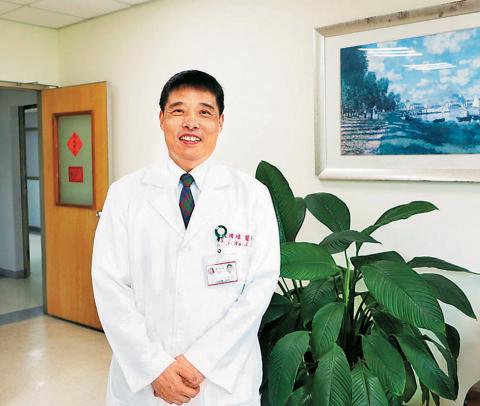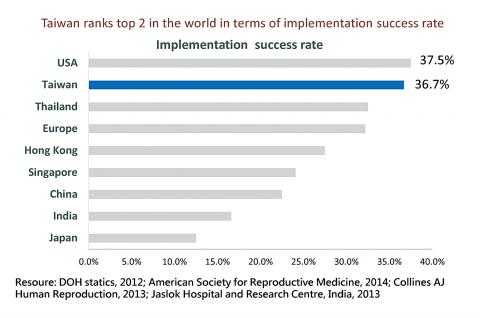As age-related infertility is becoming more common, many couples with fertility problems are not only seeking medical treatment in their own countries, but also overseas, including some who are attracted by the advanced infertility treatment in Taiwan.
Taiwanese Society for Reproductive Medicine (TSRM) president Chen Shee-uan (陳思原), a physician National Taiwan University Hospital’s (NTUH) department of obstetrics and gynecology said delayed marriage and childbearing are major factors for the increased demand for fertility services, especially in metropolitan areas.
TSRM vice president Wu Gwo-Jang (武國璋), director of Tri-Service General Hospital’s department of obstetrics and gynecology, said “The male factor is involved in about 40 percent of infertility cases... and for the female factor, about 40 to 45 percent caused by obstruction of oviduct (among them 30 to 35 percent by abnormal ovulation)”

Wu said Taiwan’s medical level of infertility treatment — in terms of knowledge, advanced technology, and clinical quality management — is relatively high in the world.
The level of Taiwan’s assisted reproductive technologies, including ovulation induction, egg retrieval, microinjection, embryo biopsy, cryopreservation, is definitely one of the best in the world, and possibly the best in Asia, Chen said.
Taiwan’s advantages include a high standard of medical morality and ethics, approachable and attentive overall healthcare services, high IVF success rates and affordable medical expenses, Wu said.

The Artificial Reproduction Act (人工生殖法) protects human rights and medical service quality standards, Wu said, adding that physicians in specialized areas can be easily approached without going through delaying referral procedures.
Moreover, he said IVF success rates and live-birth rates in Taiwan have been increasing in recent years, and data from the American Society for Reproductive Medicine shows the implementation success rate in Taiwan ranks number two, after the US, in the world.
“The IVF cumulative live birth rate for women in Taiwan is no doubt a high percentage,” Chen said.

Many couples from China, Hong Kong or Southeast Asia have come to seek treatment, as well as some Western countries — mainly Mandarin-speakers attracted by Taiwan’s advanced technologies and affordable costs, he added.
Chen said that a 35-year-old foreign patient that he had treated had experienced four IVF failures in her country, but conceived a baby during her second treatment in Taiwan, so she later introduced her younger sister, who had had two IVF failures, and she was also able to conceive.
“Infertility treatment in Taiwan is like a team with good overall abilities, not just in certain hospitals,”Chen said the reason for the high IVF success rate is that most physicians in the field follow standard procedures for each type of treatment — learned through international conferences — and share the details of their successful clinical experiences with each other.
The infertility treatment plans in Taiwan can also be customized based on the unique medical needs and specific characteristics (including age, test results and infertility factors) of each patient, he added.
In addition, Wu said many infertility treatment plans in Taiwan provide patient-centered care, with professional and through consulting, a high value on privacy, rapid testing, and careful follow-up after treatment.
“Assisted reproductive technologies are very advanced now, so infertile couples should not be embarrassed to seek treatment, but it is important that they seek treatment at accredited 79 IVF centers in Taiwan” Wu said.
Chen said people who come to Taiwan for infertility treatment can also learn about the nation’s advanced medical services, friendly environment, good public security and cultural qualities, as well as try its delicious food or visit beautiful areas.

Taipei has once again made it to the top 100 in Oxford Economics’ Global Cities Index 2025 report, moving up five places from last year to 60. The annual index, which was published last month, evaluated 1,000 of the most populated metropolises based on five indices — economics, human capital, quality of life, environment and governance. New York maintained its top spot this year, placing first in the economics index thanks to the strength of its vibrant financial industry and economic stability. Taipei ranked 263rd in economics, 44th in human capital, 15th in quality of life, 284th for environment and 75th in governance,

The Sports Administration yesterday demanded an apology from the national table tennis association for barring 17-year-old Yeh Yi-tian (葉伊恬) from competing in the upcoming World Table Tennis (WTT) United States Smash tournament in Las Vegas this July. The sports agency said in a statement that the Chinese Taipei Table Tennis Association (CTTTA) must explain to the public why it withdrew Yeh from the WTT tournament in Las Vegas. The sports agency said it contacted the association to express its disapproval of the decision-making process after receiving a complaint from Yeh’s coach, Chuang

Control Yuan Secretary-General Lee Chun-yi (李俊俋) tendered his resignation last night, admitting that he had misused a government vehicle, as reported by media. His resignation was immediately accepted by the Control Yuan. In a statement explaining why he had resigned, Lee apologized for using a Control Yuan vehicle to transport his dog to a pet grooming salon on May 20. The issue first came to light late last month, when TVBS News reported that Lee had instructed his driver to take the dog to the salon. The news channel broadcast photos that it said were taken by an unnamed whistle-blower, which purportedly showed the

A former officer in China’s People’s Liberation Army (PLA) who witnessed the aftermath of the 1989 Tiananmen Square massacre has warned that Taiwan could face a similar fate if China attempts to unify the country by force. Li Xiaoming (李曉明), who was deployed to Beijing as a junior officer during the crackdown, said Taiwanese people should study the massacre carefully, because it offers a glimpse of what Beijing is willing to do to suppress dissent. “What happened in Tiananmen Square could happen in Taiwan too,” Li told CNA in a May 22 interview, ahead of the massacre’s 36th anniversary. “If Taiwanese students or